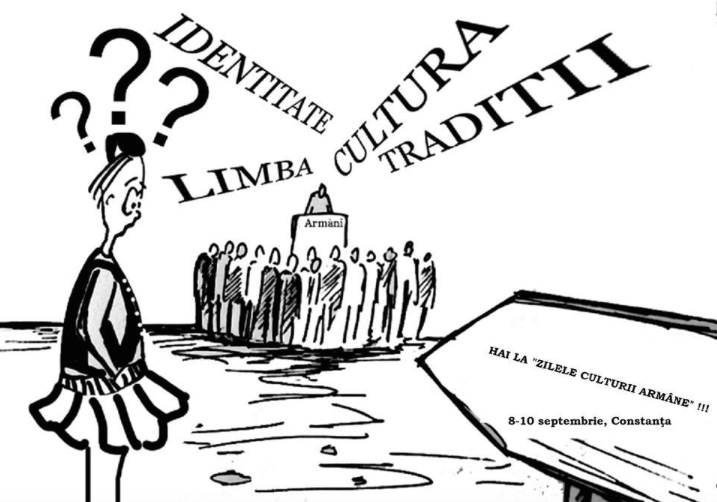Dec 29
Florentina Costea : The Armân/Aromanian community from Romania

«Comunitatea aromână din România » : acesta este titlul intervenției în engleză a Florentinei Costea la seminarul organizat anul trecut de Centrul internațional pentru minorități Convivenza la Müstair, în Elveția, pe tema îmbunătățirii vieții și instituțiilor popoarelor autohtone fără stat propriu în Europa. 35 de experți din 15 țări europene, reprezentând o duzină de comunități culturale și lingvistice fără stat propriu au participat la seminar. Prinre aceste popoare autohtone/comunități culturale și lingvistice se numără și aromânii. Despre ei au intervenit, în afară de Florentina Costea, Nicolas Caracota, Kristo Goci si S. Bletsas. Actele seminarului au fost publicate în cartea apărută anul acesta cu titlul Innovation and Learning to Manage Diversity in Governance, Raoul Blindenbacher (ed.).
The hallmark of an inclusive society is the respect and active accommodation of linguistic diversity; this is one of the keys to countering intolerance and racism. Embracing language rights is a clear step towards promoting tolerance and intercultural dialogue, as well as building stronger foundations for continuing respect for diversity. In inclusive societies, individual identity as well as national identity are important: neither excludes the other.
Similar to other minority languages, the Armân/Aromanian language is under threat of significant decline or disappearance due to such factors as the dominance of national and international languages, processes of assimilation, and a significant decline in language users. It is the language of a vivid culture, although it is spoken less and less as it does not have the proper means of promotion, ie a real language policy. The Armân/Aromanian language needs a coherent language and cultural policy to survive. The language has been in literary use since the 18th century. Its first grammar was published in 1813 and since then many textbooks, dictionaries and publications have been published in order to preserve the cultural heritage and the language.
In Romania, the most representative association of the Armâns/Aromanians is «The Armân/Aromanian Community from Romania», called «Fara Armâneascâ dit România»/«Comunitatea Armână din România» (ACR), an NGO founded in 1991 that counts over 6.500 members out of the 27,000 Aromanians officially recorded in the 2001 census, organized in six subsidiaries with juridical competence: Bucharest city and Constanţa, Călăraşi, Ialomiţa, Tulcea and Timiş districts.
The core aim of this NGO is to maintain and develop the Armân/Aromanian language, traditions and all the Armân/Aromanian culturally and spiritually specific features. Furthermore, ACR aims to facilitate contacts and connections between the Armâns/Aromanians living in different communities within their entire original space in the Balkan Peninsula, as well as with other Armân/Aromanian communities in other states.
To the same effect, one main objective is to access help from the public authorities regarding the following: the training of Armân/Aromanian language teachers and the introduction of the Armân/Aromanian language in schools as a mother tongue; the use of Armân/Aromanian language in religious services; access to mass media and editing books, journals and news- papers in the Armân/Aromanian language.
20 years after the adoption of the «Recommendation 1333/1997 on the Ar manian culture and language» by the Parliamentary Assembly of the Council of Europe, in 2017 the Armâns/Aromanians were still finding themselves under the threat of disappearance as a distinct people. The Armân/ Aromanian language needs support in order to encourage the young people from our community to learn their mother tongue. It is known that the language has a crucial role in that it is the key to classroom communication and consequently to pupils’ acquisition of knowledge. There are various ways in which bilingualism in children can be supported by education systems.
Over the past few years, several representatives of «The Armân/Aromanian Community from Romania Association» have attended the events organized by the CONVIVENZA Foundation in Disentis and Scuol, and the latest one organized in Müstair, Switzerland in October 2021, in collaboration with EURAC Research. With each of these events, we expanded our knowledge about the «language rights» domain, made visible the problems of our community, discovered similarities with the situations of other small communities from different European countries, or identified examples of good practice.
The seminar organized in Müstair was distinguished by the methodology used, which led in a very logical way to the identification of the major problems specific to small communities, but also to the concrete measures to be followed in order to address them. We were impressed by the quality of the results obtained within the diverse groups, as well as by the quality of the discussions held during the reflection moments.
Based on the knowledge acquired during the seminar, our organization decided to implement a series of the measures discussed in Müstair. Some of them will require a mid to long-term strategy, but several others can be put into practice in a much shorter period.
Thus, we are committed to:
– continuing to support the educational programs/activities for children;
– continuing to increase the presence and visibility of our language in the «digital world». We will do this as follows: first, we we will contact Facebook in order to have the menu also available in the Armân/Aromanian language; second, we will disseminate to a large extent the e-learning platform developed within «Anveatsâ Armâneashti», called «Learn Aromanian»; third, we will create a weekly podcast in our language, transmitted live on Facebook, to which young people from several countries will be invited, as well as well-known personalities from the community;
– further developing appropriate educational resources in our language;
– increasing the dialog with the local authorities, emphasizing the practices that are valid at the EU level and the provisions mentioned in documents focused on language rights;
– developing a coherent cooperation strategy at the local, regional, and international level;
– taking inspiration from other good practice models developed by similar small communities;
– and finally, diversifying the fundraising alternatives.
